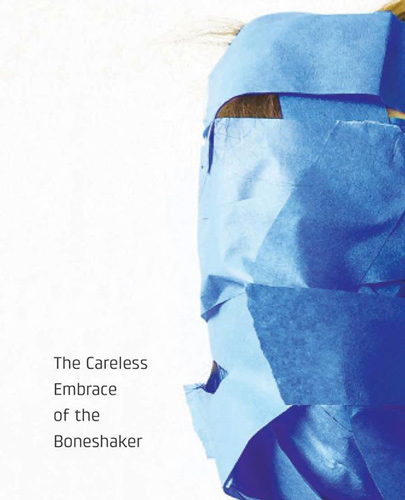The Careless Embrace of the Boneshaker
The mystifying title of this anthology—The Careless Embrace of the Boneshaker—calls for an explanation, which is forthcoming in the introduction. “Here are writers claiming who they are and screaming it from the top of their lungs. They are the boneshakers. [ . . . ] Like the 19th century bicycle prototype from which they get their name, they have no means of shock absorption.”
The mystifying title of this anthology—The Careless Embrace of the Boneshaker—calls for an explanation, which is forthcoming in the introduction. “Here are writers claiming who they are and screaming it from the top of their lungs. They are the boneshakers. [ . . . ] Like the 19th century bicycle prototype from which they get their name, they have no means of shock absorption.”
That sets us up for a whirlwind of unexpected, in-your-face, puzzling and/or satisfying pieces of literary work. Let’s start with Joel Allegretti’s “Treble in Mind.” I’m looking at what appears to be a piece of sheet music, then on the opposing page I read, “The letters of the following poem correspond sequentially to the notes of the musical composition.” Allegretti’s poem has lines such as these: “Face a cab—beg a cab.” and “Da-dee!!!”
Another example is Chris Stewart’s “Sublunary.” He places us to London at six o’clock in the morning:
He has lived his life like radio static, [ . . . ]
Like a scrambled radio transmission
ro__fo___ _ea crea_____rain___.
lu___sha___in __rk___, o_____ious ___ Plu __.
Well, you get the idea. And I must say it is challenging and can be a whole lot of fun reading experimental poetry.
In a less speculative vein, Chanel Brenner presents a more serious poem with “Chopsticks”:
It is the eighth anniversary
of her son’s
death.She sits at a table
and picks up the letters of his name
with chopsticks.She chews and swallows
each one, savoring
the severed flavors.
The Careless Embrace of the Boneshaker is the publisher’s fifth anthology, each year featuring a guest prose editor. Fiction writer Thaddeus Rutkowski has the honor for this volume, selecting Lindsy J. O’Brien’s prose piece “Normal: Adjective.” In this, she explores and rewrites expectations as she creates her own definitions beginning in the 1990s in Smalltown, Minnesota. They range from “Family will attend church three or more times per month and will spend the skipped Sundays eating steak and potatoes and harboring guilt,” to “By age eighteen, this young woman will manage to pathologically deny every bit of mounting evidence that she is not what she thinks she should be [ . . . ]”
Cornelius Fortune contributes a monologue called “Black Transience,” speaking on the experience of living as a black man in America by using trauma levels. The character is a “man in his early or mid-30s in a waiting room.” Trauma level #2 in his script reads: “[ . . . ] You must be socialized. Society thrusts you into its cavernous embrace and says, ‘adopt,’ ‘adapt,’ ‘replicate,’ ‘belong,’ but you’ve got to fit perfectly or find some other hell to fit, lodge in . . . hello, high school freshman year.” Then there’s Trauma level #5:
“Being Black in America’” [ . . . ] should be a handbook published by a major book publisher. [ . . . ] The companion volume, “Being a Black Man in America,” is much heavier—much heavier in a metaphysical sense—and by sheer volume. [ . . . ] It’s like a Harry Potter novel, only in this case, we don’t know if the boy lives at the end.
Joe Baumann creates a plot that’s a creative reverse of Shirley Jackson’s “The Lottery.” Her story had people draw tickets to see who would be killed. In this story, titled “Resurrection Day,” people buy $100 tickets to see who among the citizens’ late loved ones will be brought back to life.
This year’s interview section features punk rocker and poet Thurston Moore, bringing music and poetry together. The article’s title is “I Look for Where the Poetry Is,” and it’s conducted by George Wallace, one of the anthology editors. Moore, now 58, who founded the band Sonic Youth, says that in his late teens, “The lifestyle of a poet was my ambition. [ . . .] It was the beginning of punk rock and we were trying to create our own identity.”
Today, Moore talks about how writing lyrics and writing poetry are different, offering a unique perspective: “With lyrics the words can be dependent on the music to create some kind of unity. Whereas I find poetry on the page is singular in and of itself. With poetry you are much more aware of staying away from rhyme schemes—they can be hokey on the page but in a song they are integral.”
One of Moore’s poems follows the interview. He pens these delightful lines in “Moscow, Russia”:
Yesterday you pointed me
to a gold ray of sun
glowing the ancient paint
of a woman’s dress
in the museum
The introduction to The Careless Embrace of the Boneshaker concludes by asking the reader to let the impact of this volume “wrap itself around you.” Nicely put, and good advice to consider.





